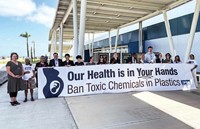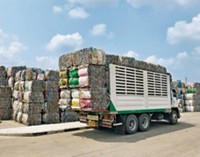Advertisement
Grab your lab coat. Let's get started
Welcome!
Welcome!
Create an account below to get 6 C&EN articles per month, receive newsletters and more - all free.
It seems this is your first time logging in online. Please enter the following information to continue.
As an ACS member you automatically get access to this site. All we need is few more details to create your reading experience.
Not you? Sign in with a different account.
Not you? Sign in with a different account.
ERROR 1
ERROR 1
ERROR 2
ERROR 2
ERROR 2
ERROR 2
ERROR 2
Password and Confirm password must match.
If you have an ACS member number, please enter it here so we can link this account to your membership. (optional)
ERROR 2
ACS values your privacy. By submitting your information, you are gaining access to C&EN and subscribing to our weekly newsletter. We use the information you provide to make your reading experience better, and we will never sell your data to third party members.
Trade
Existing treaty could help manage global plastic waste trade, researchers suggest
Basel Convention would help control flow of used material displaced by China’s ban
by Cheryl Hogue
June 20, 2018
| A version of this story appeared in
Volume 96, Issue 26

More than 100 million metric tons of plastic waste could accumulate throughout the world in the next dozen years because of China’s restrictions on imports of postconsumer plastic waste, researchers estimate. And one way to help ensure that buildup of plastic waste is handled soundly is for countries to control international trade in this material under an existing treaty that governs trade in hazardous waste, they suggest (Sci. Adv. 2018, DOI: 10.1126/sciadv.eaat0131).
A team from the University of Georgia, led by Jenna R. Jambeck, used United Nations trade data to calculate that 111 million metric tons of plastic waste could accumulate throughout the world by 2030 because of China’s policy, which took effect Jan. 1. China and Hong Kong, which has served as an entry port for many plastic shipments to China, collectively have imported 72% of the world’s plastic waste since 1992, the researchers found.
China’s move could lead to shiploads of used plastic bottles, packaging, and films flooding developing countries that don’t have well developed waste-management systems. To prevent this situation, such waste could be added to materials covered by a 1989 treaty, the Basel Convention. That accord includes a provision for controlling shipments of household waste that isn’t hazardous but requires “special consideration.”
Including used plastic in the Basel Convention could help expand developing countries’ capacity to manage this material, the researchers say. That’s because adding the material to the pact would allow treaty partners to harmonize standards and practices for handling plastic waste across the world, they explain. In addition, the accord holds waste producers and exporters accountable for ensuring that the material they ship out is properly managed by its recipient.
Jim Puckett, executive director of the environmental group Basel Action Network, says that adding plastic waste to the treaty would allow international trade in plastic waste only if the importing country gave its consent beforehand. He was not involved in the study.
Jambeck’s team also recommends that countries historically exporting the most plastic waste, which include the U.S., Japan, and Germany, boost domestic recycling of this material lest it pile up in domestic landfills because of China’s policy. They further suggest that nations wanting to accept plastic waste consider imposing an import tax to fund solid waste management infrastructure.





Join the conversation
Contact the reporter
Submit a Letter to the Editor for publication
Engage with us on Twitter